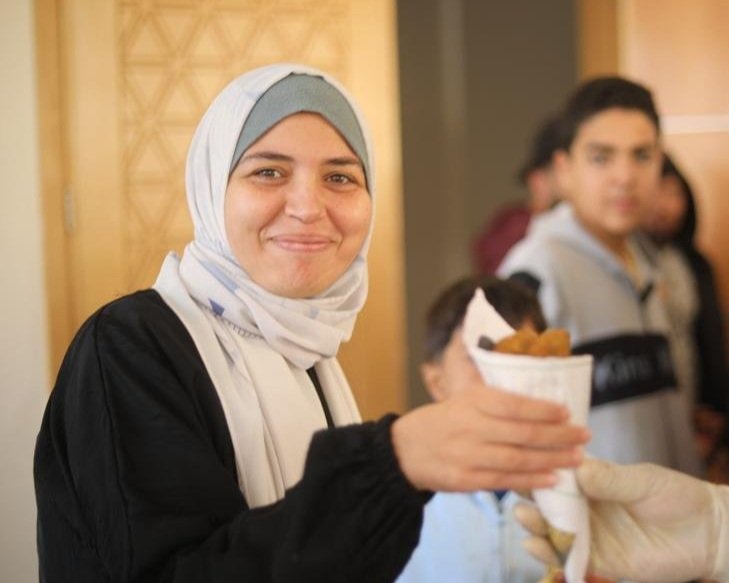Informational Webinar on How Rebuilding Alliance Feeds Families in Gaza
On Sunday, March 24, 2024, we hosted an informational webinar entitled "How Rebuilding Alliance Feeds Families in Gaza". The purpose of this webinar was to provide insight into the hot meals program being delivered by Rebuilding Alliance in Gaza. We were honored to have guests at the forefront of this program joining us from Gaza.
Lama, Lead for community-based cooking team
Video by Nour Al Halaby and Muhamamd Mansur
Heba, Program Coordinator
My name is Heba. I am an architect. I have been working with Rebuilding Alliance since 2022. Before the war, I supervised a project that helped a family in Gaza undertake critical house repairs and renovations.
I lost my home in the early days of the war. After the war, I became the coordinator for the hot meals program. I coordinate with Rebuilding Alliance's NGO partners in Gaza and many community-based cooking teams who are working in different locations in Gaza.
Our partner NGOs are doing an incredible job. Each partner is running several kitchens. Every morning the head Chef divides the tasks among the cooking team, who will carry and bring the commodities from the warehouse, who will bring vegetables and cooking items, and who will wash dishes and pots before starting cooking.
Also, who will clean the floor and worktops before and after the cooking. Each partner NGO has 9 or 10 kitchen points. Some are cooking points, others are baking points as they only prepare bread, and some do both cooking and baking. There are central kitchens, home-based kitchens, field kitchens, and bakeries.
The hot meals we provide to people bring them relief and satisfy their hunger. When the food is ready and our teams are about to distribute, people of all ages--children, and even elderly, women--holding their pans and pots rush to get the meals. It is truly a relief for them. Many families come from distant places just to have one meal. There are large gatherings of people at all distribution points.
I see good coordination among teams. All the cooking staff is working as one, as a single soul in a body. Everyone knows his role well. All of them work together to serve people, to provide them with decent meals, doing their best to feed them and bring them some relief.
Purchasing commodities is very challenging because of the war. Not all commodities are available in the market, and if people can find some of them, it is not affordable. Everything is too expensive. It is hard for kitchens to find vegetables and meat at affordable prices.
Chefs find innovative ways of cooking. They try to overcome the shortage of commodities in the market. For example, they use onion and garlic powder rather than fresh onions. As you know, the price of vegetables has increased significantly. Many, many farms have been destroyed so the supplies are short. The price of 1 kg onion is now $9 and before the war, it was less than $1.
Our partners are doing an amazing job. They are resilient, running kitchens to feed their people during bombings and in extreme danger. They spend 8 hours a day standing cooking and distributing meals.
For Ramadan, we are expanding the number of cooking and baking points so we can serve more meals a day.
Rafeek, Program Manager
I am Rafeek, a Palestinian who was born and raised in Gaza. I have 30 years of experience in humanitarian and development work. Currently, I am working as a program manager on the project "By the Hands of Your People" with Rebuilding Alliance. This project has made a significant impact on my life as I am serving in a project that provides food to displaced people who have no means to survive.
What sets this experience apart for me is that I am living in the same conditions as the beneficiaries since I am also displaced and living in a tent. Hence, I understand the plight of being in a tent without any resources, not even food.
I am proud of what I am doing, and our partners are helping the local people serve hot meals. We work together as a family, and when the holy month of Ramadan started, we decided to expand our target and feed 100,000 people daily.
It was a pleasant surprise for all of us that our cooking teams managed to go beyond that number and reach a higher number of beneficiaries. It is unimaginable how we are feeding this number of people, and we are working in life-threatening conditions. However, our passion and enthusiasm to help people drive us to work hard and create a positive impact on the ground.


